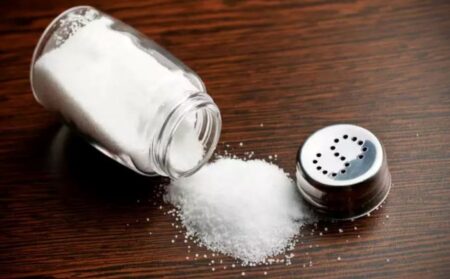DID you know that iodine is used by the thyroid, a gland that controls heart, muscle and digestive function, brain development and bone health? According to the federal Department of Health, our food supply is low in iodine content, and this is a real concern given that the thyroid is the central health control unit of the body.
The human body does not itself produce iodine, so it must come from your diet. There are various foods which contain iodine. But unless you are a daily oyster eater or milk drinker you have to try hard to get to the 150 micrograms a day adults need.
That’s why the World Health Organisation recommends ‘fortification’. In other words, iodine should be taken as a supplement by itself, or it should be added to something you eat. In Australia, it is compulsory for iodised salt to be used in bread, but this may not be the most effective way of trying to make sure everyone gets enough iodine.
This is where table salt comes in. Just as most drinking water supply systems in the developed world add fluoride to protect dental health, iodine is commonly added to table salt to keep your thyroid gland and yourself hale and hearty. Everyone drinks water, everyone uses salt.
Iodized salt contains 45 micrograms of iodine per gram of salt.
Salt, as we all know, is not good for you.
So, it’s not a good idea to increase your salt intake to make sure you get your iodine, but it is a good idea to use iodised salt when you use salt.
Unfortunately, iodised table salt is being pushed out by salt without the vital iodine additive.
Professor of Medicine, Creswell Eastman, lamented in the Sydney Morning Herald recently that “it is frequently difficult to find any iodised table salt on display in our grocery stores, where the shelves are dominated by un-iodised crude, pink crystalline salts imported from salt mines in Pakistan and labelled as ‘Himalayan salt’ – somehow conveying some mystic qualities on these products”.
Professor Eastman admits to very un-professorial acts: “When I get the opportunity, I furtively look for the iodised salt products and bring them to the front of the shelf and push the un-iodised products to the back”.
Apart from keeping you healthy day-to-day, adequate, long-term iodine ingestion also makes you live longer a 2020 Danish study found.
The study compared residents of the coastal city of Skagen and the inland city of Randers. Skagen uses groundwater for its drinking water. This drinking water contains high levels of iodine. This meant that people from Skagen had adequate levels of iodine. Randers didn’t have the benefit of drinking water high in iodine. Its residents as a group showed a slight iodine deficiency.
As a result, there was far more thyroid-related disease around in Randers (26 per cent) than in Skagen (6 per cent).
The Danish study then tried to find out if there was link between long-term residency in Skagen and Randers and life span. This follow-up occurred twenty years after the initial investigation showing the difference in the incidence of thyroid disease in Skagen and Randers. The follow-up looked at what had happened to people aged 55 to 60 after twenty years.
It turned out that overall, 88 per cent of Skagenians had died compared with 95 per cent Randersians. Skagenians had stayed alive longer!
The study noted that an inadequate iodine intake is linked to thyroid disease. Importantly, the study notes that this link becomes stronger with advancing age.
Now, what type of salt are you going to buy next time you go to the supermarket?
That’s right, and while you’re at it, move some of those iodised salt containers to the front of the shelf, will you?
Professor Eastman approves!
